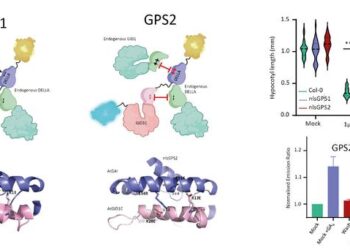The rate of colorectal cancer screenings more than doubled when patients were given a choice between which type of screening they wanted—a take-home kit or colonoscopy—compared to those who were only offered the colonoscopy, according to new research led by the Perelman School of Medicine at the University of Pennsylvania. Facilitated through a community health center in which about half of patients had Medicaid insurance, the study—published in Clinical Gastroenterology and Hepatology—provides insights about how to boost screenings among groups that are typically less likely to have the test.
The rate of colorectal cancer screenings more than doubled when patients were given a choice between which type of screening they wanted—a take-home kit or colonoscopy—compared to those who were only offered the colonoscopy, according to new research led by the Perelman School of Medicine at the University of Pennsylvania. Facilitated through a community health center in which about half of patients had Medicaid insurance, the study—published in Clinical Gastroenterology and Hepatology—provides insights about how to boost screenings among groups that are typically less likely to have the test.
“Offering the choice of colonoscopy or take-home kits seem to have the advantage of maximizing the rates of colonoscopy—the most effective screening tool—while not overloading individuals with too much of a choice, which could have lowered overall participation,” said the study’s lead author, Shivan Mehta, MD, MBA, MSHP, Penn Medicine’s associate chief innovation officer and an associate professor of Gastroenterology.
Colon cancer screening is now recommended for patients of average risk—meaning no personal or family history of the disease, among other factors—beginning at age 45. There two main methods are colonoscopies, which are recommended once every 10 years for a person to be considered “up-to-date,” or take-home fecal immunochemical tests, which can be completed once a year in lieu of a colonoscopy, provided there are no abnormal findings.
When patients in Mehta’s study were offered only a colonoscopy, the study showed that just under six percent completed the test within six months. But when patients were given the opportunity to choose between a colonoscopy and a fecal immunochemical test (FIT)—which can be completed at home and mailed in, pre-paid, to the lab—the completion rates jumped to almost 13 percent. Among the group who were offered a choice between the two methods, approximately 10 percent received colonoscopies.
One arm of the study only offered patients the FIT kits, and about 11 percent of patients completed them within six months. While this was also an improvement on the colonoscopy-only offer, FIT kits are typically used to keep a patient up-to-date on their colorectal cancer screening for one year. Colonoscopies can identify early stages of cancer and allow for removal of pre-cancerous polyps. One screening could keep a patient up-to-date on screening for up to a decade.
The study was conducted among 738 patients aged between 50 and 74 at a community health center in Pottstown, PA. Researchers described the population as being “socio-economically underserved,” with about half the patients receiving Medicaid, and a baseline screening rate before the trial of about 22 percent, much lower than the national average, which is about 72 percent.
Despite the promising outcome from this study, there’s still more work to do. “There are certainly colonoscopy access issues across the country due to recovery from a slowdown during the pandemic and the expansion of screening recommendations for the younger population, but it might affect community health center populations more,” Mehta said. “Colonoscopy is important for screening, diagnosis of symptoms, and follow-up of positive stool testing, but we should think about offering less invasive options as an alternative and as a choice if we want to increase screening rates.”
Another important aspect of this study was that it offered screening through mailed outreach, which has been shown to boost screening rates in the past since it does not rely on patients coming in to the clinic. This also may have explained the low overall response rate.
Research on how screenings are offered could play a greater role in improving surveillance and outcomes among even younger populations than those studied, as colorectal cancer rates have risen among patients younger than 50.
This study was funded by a Young Investigator Award from the National Comprehensive Cancer Network. It was also partially funded by the National Cancer Institute (K08CA234326).
Journal
Clinical Gastroenterology and Hepatology
Method of Research
Randomized controlled/clinical trial
Article Title
A Randomized Trial of Choice Architecture and Mailed Colorectal Cancer Screening Outreach in a Community Health Setting
Discover more from Science
Subscribe to get the latest posts sent to your email.



